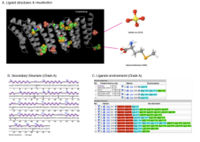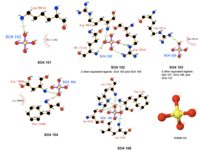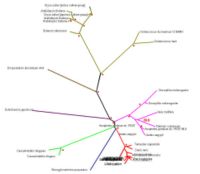Discussion of SNAPG: Difference between revisions
No edit summary |
No edit summary |
||
| Line 13: | Line 13: | ||
SNAP-gamma protein evolutionary tree mostly contains more than 75% boostrapvalue. Thus, red dot signs was assign to represent more than 75% boostrap value. The value was indicated the degree of confidence about the branching order. As an example: in the diagram phylogenetic tree (''see Figure 3''), there is 39.0 boostrap value in branching ''Apis melifera'' and ''Tribolium castaneum''. The boostrap value is below 75%, thus it could be concluded that the degree of confidence of branching tree in the correct order is far below 95%. On the other hand, boostrap value more than 75% or 75.00 means 95% confidence that the branching tree is in the correct order | SNAP-gamma protein evolutionary tree mostly contains more than 75% boostrapvalue. Thus, red dot signs was assign to represent more than 75% boostrap value. The value was indicated the degree of confidence about the branching order. As an example: in the diagram phylogenetic tree (''see Figure 3''), there is 39.0 boostrap value in branching ''Apis melifera'' and ''Tribolium castaneum''. The boostrap value is below 75%, thus it could be concluded that the degree of confidence of branching tree in the correct order is far below 95%. On the other hand, boostrap value more than 75% or 75.00 means 95% confidence that the branching tree is in the correct order | ||
As indicated in diagram | As indicated in diagram in Figure 3, SNAP-gamma protein was evolved in eukaryotes. There is no prokaryotes organism detected in the phylogenetic tree. | ||
Function (in various organism) = nunggu justine | Function (in various organism) = nunggu justine (suggest function: almost similar with other organism, too) | ||
Thus, it could be concluded that SNAP-gamma protein is important protein in eukaryotes animal. | Thus, it could be concluded that SNAP-gamma protein is an important protein in eukaryotes animal. | ||
Revision as of 11:49, 11 June 2007

nanti aku mau jelasin ttg ligandnya
Tea: evolution linked with function.
SNAP-gamma protein evolutionary tree mostly contains more than 75% boostrapvalue. Thus, red dot signs was assign to represent more than 75% boostrap value. The value was indicated the degree of confidence about the branching order. As an example: in the diagram phylogenetic tree (see Figure 3), there is 39.0 boostrap value in branching Apis melifera and Tribolium castaneum. The boostrap value is below 75%, thus it could be concluded that the degree of confidence of branching tree in the correct order is far below 95%. On the other hand, boostrap value more than 75% or 75.00 means 95% confidence that the branching tree is in the correct order
As indicated in diagram in Figure 3, SNAP-gamma protein was evolved in eukaryotes. There is no prokaryotes organism detected in the phylogenetic tree.
Function (in various organism) = nunggu justine (suggest function: almost similar with other organism, too)
Thus, it could be concluded that SNAP-gamma protein is an important protein in eukaryotes animal.

